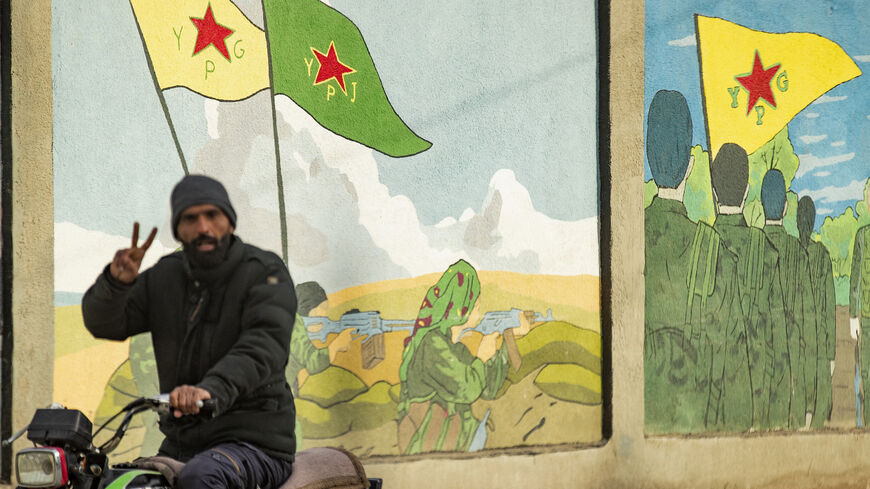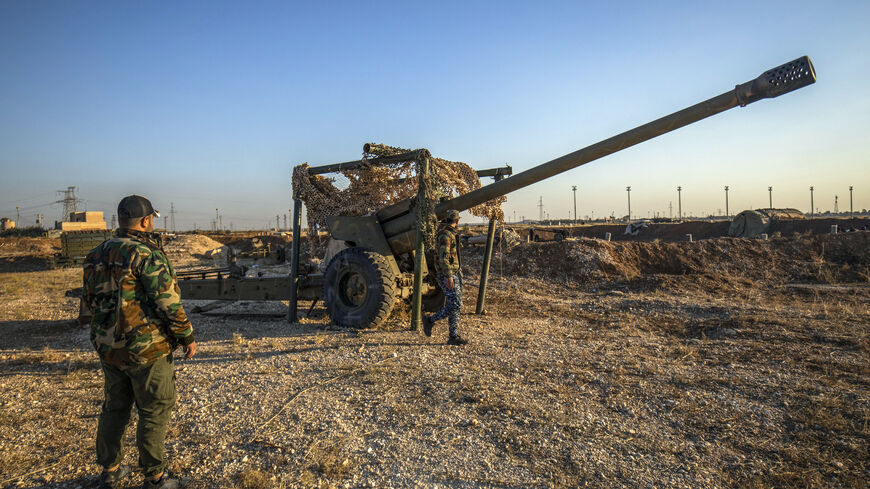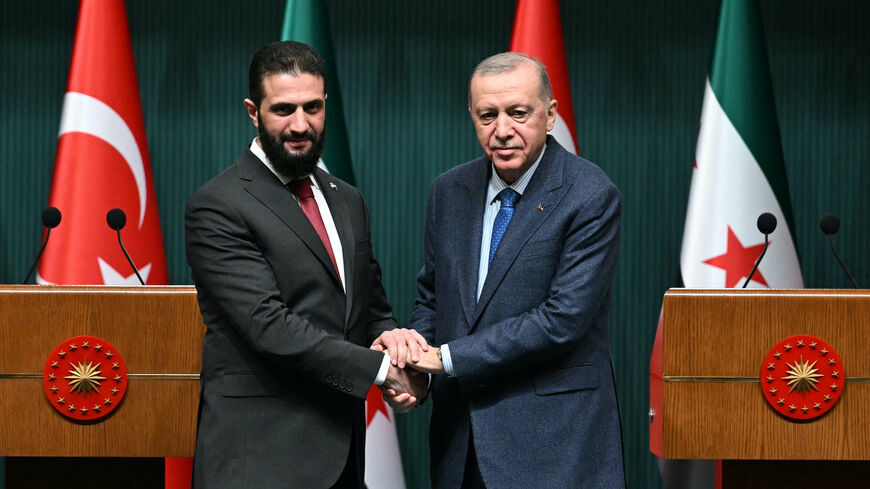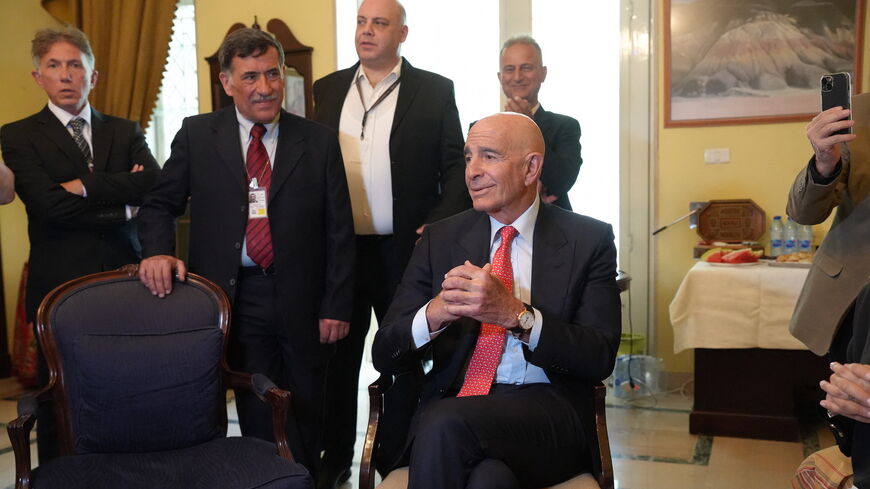Turkey-backed Syrian factions end US-mediated ceasefire with Kurdish-led SDF
Sources told Al-Monitor that negotiations between the sides had “failed” amid “significant military buildups” on the Turkish border.
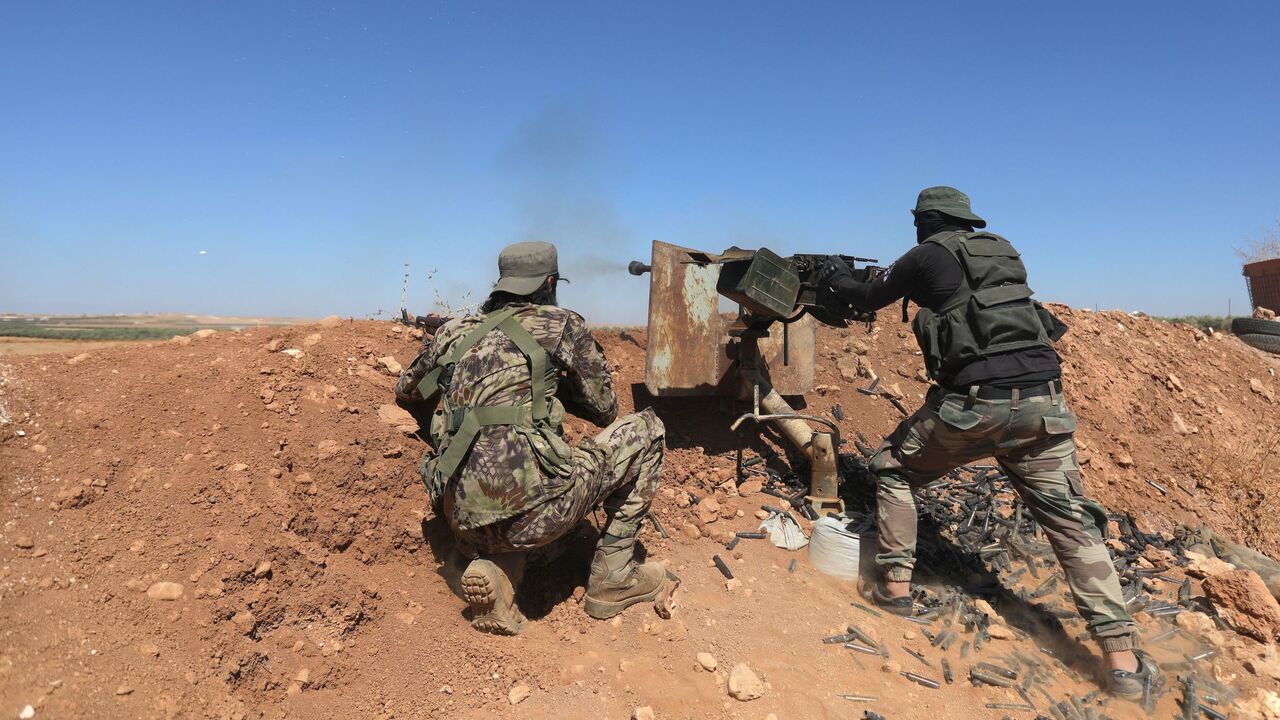
The Turkish-backed Syrian National Army has ended a ceasefire reached through US mediation last week, which had led to the withdrawal of the Kurdish-led Syrian Democratic Forces from the town of Manbij, well-placed sources speaking not for attribution told Al-Monitor.
The SNA, an umbrella of several armed factions, informed the SDF on Monday that it would be returning to “a state of combat against us," one of the sources briefing Al-Monitor said. The sources said negotiations between the SDF and the SNA had “failed” and that “significant military buildups” in areas east and west of the Kurdish town of Kobani on the Turkish border were being observed.
The sources said the disagreement centered on the status of Kobani. The SDF proposed the establishment of a demilitarized zone in Kobani and the nearby Suleyman Shah area, but this had been rejected, the sources said.
At the time of publication, the US-led coalition was still working on getting the SNA to extend the same ceasefire, the sources said. However, the outcome of the coalition’s effort remains uncertain.
The US-brokered ceasefire was based on the understanding that Turkey and its SNA allies would not advance west of the Euphrates River. US Secretary of State Antony Blinken traveled to Ankara on Thursday, where he met with Turkish President Recep Tayyip Erdogan to appeal for an enforcement of those terms, alongside other issues related to Syria. However, Turkey seems unwilling to stick with them, the sources briefing Al-Monitor said.
The end of the four-day-long ceasefire came as Turkish leaders toughened their rhetoric against the SDF, which is the US-led coalition’s top ally against the Islamic State (ISIS) in Syria. Turkey’s ruling Justice and Development Party (AKP) spokesperson Omer Celik on Monday likened the Syrian Kurds’ self-declared government, known as the Democratic Autonomous Administration of North and East Syria (DAANES), to a “micro-Baathist state” and reiterated Ankara’s vows to collapse the entity over its links to the outlawed Kurdistan Workers Party (PKK).
Kobani assumed great symbolic significance for millions of Kurds worldwide when it was besieged by ISIS in 2014 and succeeded in breaking that siege with the help of the US-led coalition. Tensions in Turkey’s predominantly Kurdish southeast region sharply escalated over that period, when Erdogan appeared to be cheering on the jihadis. Faced with an outcry, Ankara allowed Iraqi Kurdish peshmerga fighters to join the battle by letting them cross into Kobani via Turkey.
In February 2015, when peace talks between Turkey and the PKK were still ongoing, the People’s Protection Units (YPG) assisted Turkish forces in relocating the remains of Suleyman Shah, the grandfather of the founder of the Ottoman Empire, from a site near Kobani to a hill near the Turkish border. Prior to the Syrian conflict, the site was protected by Turkish soldiers under an agreement with Damascus, but it was encircled by ISIS and Ankara feared the jihadis would blow it up.
On Friday, Turkish Foreign Minister Hakan Fidan told the NTV news channel that “our strategic goal is to eliminate the YPG, to get rid of it.” The YPG is the Syrian arm of the PKK and forms the backbone of the SDF.
The latter has more Arabs than Kurds in its ranks, as part of a coalition strategy to secure support from Arab tribes in majority-Arab areas like Raqqa and Deir Ezzor, which are governed by DAANES. This approach also aims to counter Turkey's accusations that the group is the PKK disguised in US-provided uniforms.
Fidan noted that in a “first phase,” all the YPG’s non-Syrian cadres would need to leave Syria, though he did not specify a destination. In a second phase, all Syrians within the YPG’s command structure would need to leave the country as well. Would this include SDF chief Mazloum Kobane, a senior ranking figure in the PKK for many years?
The question is a critical one. Kobane is a highly trusted ally of the US Central Command, to the extent that it has been made clear on several occasions that replacing him could jeopardize the coalition’s operations in Syria. He also enjoys strong popular support in the Kurdish-run zone that transcends his background in the rebel outfit.
Last week, Kobane offered Turkey via the international media to restore Suleyman Shah's relics to their original resting place. He relaunched the offer on Monday via X, saying his forces would be willing to provide access to the site, ostensibly via Kobani as in 2014.
Turkey has yet to respond to Kobane's latest olive branch, reinforcing fears that the site will be seized by force.
Good Kurds, bad Kurds
Several other key DAANES, YPG and SDF leaders were active in the PKK, which has been waging an armed conflict against the Turkish state since 1984 and is designated as a terrorist group by Turkey, the United States and the European Union. Ankara cites these links as proof that the Syrian Kurdish entity poses an existential threat to Turkey, even though Turkish officials engaged with those very same officials when a peace process was still ongoing with the PKK. The negotiations ended in 2015 in part because the Syrian Kurds resisted Ankara’s pressure to join the Sunni opposition’s battle against Syria’s former dictator, Bashar al-Assad, and decided to focus on consolidating their autonomy instead.
However, in recent months, Turkish officials have resumed contact with the DAANES leadership via intermediaries, Ilham Ahmed, the entity’s de facto foreign minister, told Al-Monitor in an interview last month. The outreach was linked to AKP efforts to harness Kurdish support for its own domestic political calculations as much as to get ahead of potential threats arising from the dramatic shift in regional balances triggered by Hamas’ Oct. 7 assault against Israel. Assad’s fall appears to have upended all those calculations.
Fidan stressed that Turkey had no quarrel with ordinary Kurds who were being subjected to “tyranny” by PKK-linked groups. Ankara has long promoted the rival Kurdistan National Council as an alternative to the current leadership and is likely pressuring Syria’s new interim government, led by Hayat Tahrir al-Sham, to engage with them instead.
Both the SDF and the KNC have been putting out statements calling for Kurdish unity as the new order is being established in Syria after Assad’s surprise ouster. However, neither side has taken any concrete action thus far.
On Monday, DAANES called on all Syrian parties to “join hands, unite and draw a shared roadmap for the future,” saying that cooperation between itself and the new administration in Damascus would be “in favor of all Syrians.”
HTS leader Ahmed Al-Sharaa, previously known by his nom de guerre, Abu Mohammed al-Golani, has called the Kurds “part of the homeland” and assured them that there would be “no injustice” against them. “The coming Syria will have the Kurds as an essential component, and we will live together in it, and everyone will take their rights,” he said. Unlike the SNA, the HTS leadership has not parroted Ankara’s rhetoric about the SDF and the YPG. But it has yet to respond positively to the SDF’s calls for high-level talks, likely to avoid upsetting Turkey, which, with thousands of troops on the ground, is the most influential foreign actor in post-Assad Syria.
Turkish Defense Minister Yasar Guler told reporters on Sunday that the new leadership in Damascus wanted the “PKK/YPG terror organization to be dissolved.”
In a further alarming development for Syria’s Kurds, US President-elect Donald Trump appeared to signal approval for Turkey's role in bringing down the Assad regime through its long-running support for the Sunni opposition.
“I think Turkey is very smart. … Turkey did an unfriendly takeover, without a lot of lives being lost. I can say that Assad was a butcher, what he did to children,” Trump told reporters at his residence in Florida.
"Erdogan is somebody I got along with great ... He's built a very strong, powerful army," Trump added. "I think Turkey is going to hold the key to Syria."
In 2019, Trump gave Turkey the green light to invade large chunks of the Kurdish-controlled zone and had even ordered some 900 Special Operation Forces deployed there to fight ISIS to withdraw. He was forced to rescind the order amid an outcry from the US Congress.
Turkey is now pressing Washington to let it deploy three commando brigades to replace the SDF in the anti-ISIS mission and to assume responsibility for several detention centers for tens of thousands of ISIS prisoners and their families. Guler echoed Fidan’s view that the ISIS threat was being deliberately exaggerated by the YPG. “Has anyone heard of [ISIS] terrorists attacking in Syria in the last three years,” Guler asked. “We do not hear or see anything about [ISIS] right now.” The US Central Command believes otherwise, noting in its most recent quarterly report submitted to Congress at the end of October that the outfit remains “a significant threat.”
This developing story has been updated since initial publication.

